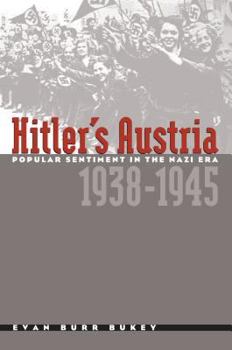Hitler's Austria: Popular Sentiment in the Nazi Era, 1938-1945
Select Format
Select Condition 
Book Overview
Although Austrians comprised only 8 percent of the population of Hitler's Reich, they made up 14 percent of SS members and 40 percent of those involved in the Nazis' killing operations. This was no coincidence. Popular anti-Semitism was so powerful in Austria that once deportations of Jews began in 1941, the streets of Vienna were frequently lined with crowds of bystanders shouting their approval. Such scenes did not occur in Berlin. Exploring the convictions behind these phenomena, Evan Bukey offers a detailed examination of popular opinion in Hitler's native country after the Anschluss (annexation) of 1938. He uses evidence gathered in Europe and the United States--including highly confidential reports of the Nazi Security Service--to dissect the reactions, views, and conduct of disparate political and social groups, most notably the Austrian Nazi Party, the industrial working class, the Catholic Church, and the farming community. Sketching a nuanced and complex portrait of Austrian attitudes and behavior in the Nazi era, Bukey demonstrates that despite widespread dissent, discontent, and noncompliance, a majority of the Austrian populace supported the Anschluss regime until the bitter end, particularly in its economic and social policies and its actions against Jews.
Format:Hardcover
Language:English
ISBN:0807825166
ISBN13:9780807825167
Release Date:January 2000
Publisher:University of North Carolina Press
Length:336 Pages
Weight:1.32 lbs.
Dimensions:1.1" x 6.1" x 9.3"
Customer Reviews
1 rating
Austrian Nazis a new image of Austrians
Published by Thriftbooks.com User , 24 years ago
One can observe the conditions of austrian Anschluss with Germany based on party politics, military take overs and repressive institutions. "Hitler's Austria" reveals the values and emotions that regular Austrians felt in having there nation become the first victim or collaborator. In these these eight years of German annexation feeling were elated at arrival and wavered toward the end. It is during this time that Austria's struggle to become an independent state as well as national mentality develops separate from the regulations imposed by a truely repressive, foreign regime. Austrians despite overt collaboration with Nazis are ultimately free from major guilt. Burkey effectively portrays a continual amniguity or even paradox in Austria reconciling to its guilt as a participant in the atrocities of Anschluss, World War II, and the Holocaust. I would recommend this book for anyone interested in modern Central European history.





